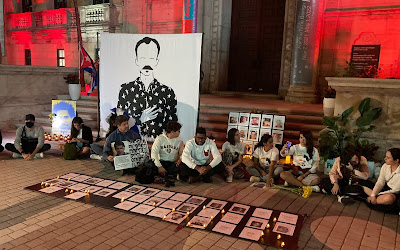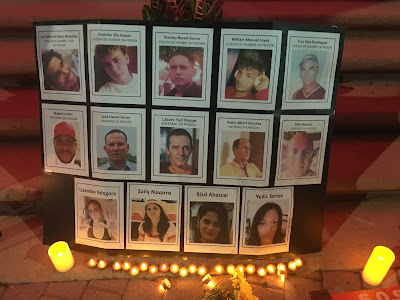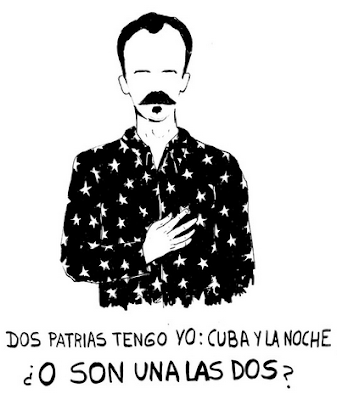"I think they kill my child every time they deprive a person of their right to think." - José Martí
 |
| 28 January 1853 – 19 May 1895 |
José Martí was a poet, journalist, and Cuban independence leader. He had also endured prison for writings critical of the Spanish government. He organized a war of independence, but did so without resorting to dehumanizing his adversary or appealing to hatred. He was also a fierce advocate for civil liberties and especially freedom of thought and expression. Today, January 28 marks 170 years since the day José Julián Martí Pérez was born.
The communist dictatorship in Cuba claims José Martí as its own, but their ideology and actions are in stark contrast to his values.
Over a thousand sons and daughters of Cuba are arbitrarily and unjustly imprisoned today for exercising their right to free thought and expression in calling for freedom in July 2021. Eleven thousand are jailed for pre-crime in Cuba. The regime jails them for what they might potentially do in the future. Millions of Cubans have gone into exile, and many are barred from returning home by the Castro regime. The Castro regime continues to kill Cubans for standing up for freedom or attempting to flee Cuba to live in freedom. It has criminalized free speech, and jailed artists and independent journalists for exercising their profession.
 |
| José Martí with shirt of stars by Camila Ramírez Lobón |
Ideas expressed below by José Martí are in conflict with Castroism, but are in accord with the democratic Cuba that helped draft the Universal Declaration of Human Rights in 1948, and struggled for a more just and democratic order, but was damaged by Fulgencio Batista after 1952 then systematically destroyed by the Castro brothers after 1959.
"Man loves liberty, even if he does not know that he loves it. He is driven by it and flees from where it does not exist."
"Freedoms, like privileges, prevail or are imperiled together You cannot harm or strive to achieve one without harming or furthering all."
"Liberty is the right of every man to be honest, to think and to speak without hypocrisy."
"It is the duty of man to raise up man. One is guilty of all abjection that one does not help to relieve. Only those who spread treachery, fire, and death out of hatred for the prosperity of others are undeserving of pity."
Martí also criticized the writings of Karl Marx, observing they were antithetical to his own values. If one considers that he wrote, "It is the duty of man to raise up man. One is guilty of all abjection that one does not help to relieve. Only those who spread treachery, fire, and death out of hatred for the prosperity of others are undeserving of pity." He was a contemporary of Marx who had written in 1849, "We are ruthless and ask no quarter from you. When our turn comes we shall not disguise our terrorism." Martí recognized the dangers of Socialism and its doctrine of envy, observing:
"Socialist ideology, like so many others, has two main dangers. One stems from confused and incomplete readings of foreign texts, and the other from the arrogance and hidden rage of those who, in order to climb up in the world, pretend to be frantic defenders of the helpless so as to have shoulders on which to stand."
The observation of José Martí that “A revolution is still necessary: the one that does not make its caudillo president, the revolution against revolutions, the uprising of all peaceful men, once soldiers, so that neither they nor anyone will ever be so again,” is a damning indictment of the 64 year dictatorship of the Castro brothers, but also relevant to free Cubans.
Martí wrote this before nonviolence was recognized as a powerful force to be used to achieve change. He led the effort to initiate Cuba's second war of independence and was killed in action during an early skirmish in that war in 1895.
However, the idea of an uprising of nonviolent men and women to carry out a "revolution against revolutions" that will usher in a democracy, and not another dictator, is precisely what many Cubans want.
Today also marks five years since nonviolence scholar Gene Sharp died. He taught generations that there was an alternative to bloody conflict and that it was non-violent armed conflict. Professor Sharp practiced nonviolence as a conscientious objector during the Korean War, and studied the examples of Mohandas Gandhi, the Reverend Martin Luther King Jr., and many other nonviolent practitioners. He demonstrated that nonviolent resistance was anything but passive, and that success in a struggle required strategy as well.
 |
| January 21, 1928 – January 28, 2018 |
Gene Sharp presented his case succinctly at the National Conference on Nonviolent Sanctions and Defense in Boston in 1990.
"I say nonviolent struggle is armed struggle. And we have to take back that term from those advocates of violence who seek to justify with pretty words that kind of combat. Only with this type of struggle one fights with psychological weapons, social weapons, economic weapons and political weapons. And that this is ultimately more powerful against oppression, injustice and tyranny then violence."
Cubans of all ideological stripes claim him as their own, but
objectively who has maintained the spirit of his words and ideals? Castroism is the antithesis of all that José Martí represented.
There is a movement that seeks to restore human rights and liberties using nonviolent means that uphold his values. These are courageous men and women who risk all standing up to the Cuban dictatorship. Many have been jailed, some have been killed, and their families targeted for reprisals in this struggle for freedom.
 |
| Oswaldo Payá Sardiñas addresses the EU parliament (2002) |
"The first victory we can claim is that our hearts are free of hatred. Hence we say to those who persecute us and who try to dominate us: ‘You are my brother. I do not hate you, but you are not going to dominate me by fear. I do not wish to impose my truth, nor do I wish you to impose yours on me. We are going to seek the truth together.’"
It also leads to #27N and the San Isidro Movement, and on January 27, 2021, artists, journalists and intellectuals peacefully gathered in front of the Ministry of Culture to read the works of José Martí. They are his descendants.
 |
| The San Isidro Movement |
Two years ago on the eve of the 168th anniversary of José Martí's birth, approximately 20 artists, journalists and intellectuals gathered mark the two month anniversary of hundreds of artists and intellectuals protesting at the Ministry of Culture on November 27, 2020 for freedom of expression following the government raid on the San Isidro Movement's headquarters in Havana hours earlier. Out of this public demonstration, the Vice Minister of Culture agreed to meet with 32 representatives and committed to an ongoing dialogue. The 27N movement was formed that same night, but afterwards the regime official reneged on his pledge.
Carolina
Barrero, an art historian, led the group in reading the poem "Dos
Patrias," which translates to "Two Homelands," and posted the video on
Facebook.
27 de enero de 2021.
— Carolina Barrero (@carolinabferrer) January 27, 2022
Dos patrias tengo yo: Cuba y la noche. ¿O son una las dos?
José Martí @27n #DosPatriastengoyoCubaylanoche pic.twitter.com/Kr0fvyLztI
On January 27, 2021, Diario de Cuba reported on the preemptive
arrests, an act of repudiation against the gathered artists and
intellectuals, led by the Minister of Culture Alpidio Alonso and his
Vice-Minister Fernando León Jacomino, who were caught on camera
physically assaulting them. Secret police arrested the dissidents and crammed them into a small bus before beating them up while they were already detained.
Carolina Barrero was charged with "Clandestine Printing," a crime under Article 210 of the Castro regime's penal code, for distributing the above image, and a case was filed against her.
On March 21, 2021 Cuban artist Camila Ramírez Lobón identified herself as the author of the image and challenged regime officials: “The law that you want to apply against the beauty, in the full sense of the word, that Carolina embodies, you will have to use against me, too,” she wrote.
 |
| Camila Ramírez Lobón |
Other heirs, are to be found in Cuban diaspora, one of
them is Patiño Vázquez, a self described "Cuban-American child of mambo
and rock & roll." He created his own arrangement, a musical setting for this work of poetry.
Two Homelands
By José
Martí
I've got two homelands: Cuba and the night.
Or are both the same? As soon as
the sun withdraws its majesty, with long veils
and holding a carnation, silent,
Cuba, like a sad widow, appears in front of me
I know which bloody carnation trembles in her hand!
My chest is empty, it is torn and empty where the heart used to be.
It's time to start dying. The night is right to say good-bye.
The light disturbs and the human word.
The universe speaks better than (the) man.
Like a flag that invites you to battle, the red flame of the sail flatters.
I open the windows, already tight inside of me.
Muted, breaking the carnation's leaves, like a cloud that blurs the sky,
Cuba, a widow, passes...
In 2023 the heirs of Martí are subjected to political show trials, beatings, forced exile, and extrajudicial executions by the Castro dictatorship that has created an even more draconian penal code to punish those that dare exercise their fundamental human rights in expressing their desire for freedom.
On what side would José Martí have stood?




















